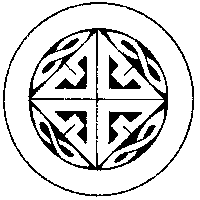Gaelic Literature
Celtic literature may be literature about Celts, or elements of Irish literature, British literature or Celtic-influenced literature from elsewhere. Although often written in English, Celtic literature may be composed in Celtic languages: Irish, Welsh, Cornish, Manx, Scottish Gaelic and Breton or their older forms; literature in Scots and Ulster Scots may also be included within the concept.
The Gaelic Revival reintroduced Celtic themes into modern literature. The concept of Celticity encouraged cross-fertilisation between Celtic cultures. There have been modern texts based around Celtic literature. Bernard Cornwell writes about the Arthurian legends in his series The Warlord Chronicles. Other writers of Celtic literature in English include Dylan Thomas and Sian James.
The introduction of Celtic into Ireland has not
been authoritatively dated, but it cannot be
later than the arrival there of the first
settlers of the La Tène culture in the 3rd
century bc. The language is often described in
its earliest form as
Goídelic, named after the Celts
(Goídil; singular, Goídel) who spoke it. The
modern form, known in English as Gaelic (in
Gaelic called Gaedhilge or Gaeilge), is derived
from the Scottish Gàidhlig.
The earliest evidence of Irish Gaelic
consists of archaic sepulchral inscriptions in
the ogham alphabet based on a system of strokes
and notches cut on the edges of stone or wood
usually ascribed to the 4th and 5th centuries
ad. Writings in the Roman alphabet date from
8th-century glosses in Old Irish, but 7th- and
even 6th-century compositions are preserved in
much later manuscripts. Four distinct periods
are recognizable in Irish
Gaelic literature. The early literature
(linguistically Archaic, Old, and Early Middle
Irish), was composed by a professional class,
the fili (singular, fili), and by churchmen. The
medieval literature (linguistically late Middle
and Classical Modern Irish) was dominated by the
lay and hereditary bardic orders. In the late
literature (17th century to the end of the 19th)
authorship passed into the hands of individuals
among the peasants, the class to which most
Irish speakers had been reduced, using the
dialects into which the language had been broken
up. The subsequent revival has continued to the
present day.
"May your good work prosper. Good health
to you. May God bless.
Beir
bua ar do chuid oibre. Sla/inte
chugat.Go mbeannai/ Dia duit."
![]() Return to Indigenous
Peoples' Literature
Return to Indigenous
Peoples' Literature
Compiled by: Glenn
Welker
ghwelker@gmx.com
This site has been accessed 10,000,000 times since February 8, 1996.
This page last updated 06/02/2019 15:34:56